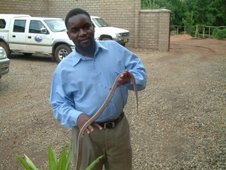
This article appeared in Sapitwa Newsletter and the Sunday Times
From bees now come money
by Hastings Maloya
Stories of bees having disturbed gatherings especially at funerals are very common in Malawi. Through the popular Nkhani za Mmaboma programme on MBC Radio 2, stories have been said on how bees in different parts of the country have made people run for their lives. To some extent communities have associated bees with some kind of witchcraft. But apart from the fact that bees can sting and cause havoc, what more do we know about them?
They produce honey.
And indeed over the years since time in memorial, people especially in Africa have enjoyed honey from bees. It could be the process of getting honey thus cumbersome but the joy associated with it surpasses the problems in trying to get it. The taste of honey has also led to lovers calling each other ‘honey’ in comparison to the taste thus delivered from products of bees.
Now honey is money. In most parts of Malawi, today bee keeping has become a potential activity that is quickly becoming a source of income. It is also an initiative in line with sustainable natural resource conservation and utilisation. Different non-governmental organisations that are promoting sustainable livelihood initiatives are encouraging communities to take up a challenge in bee keeping.
The Mulanje Mountain Conservation Trust (MMCT) is facilitating bee keeping initiatives among communities living in and around the Mulanje Mountain Forest Reserve. The ultimate output is conservation of Mulanje Mountain natural resources and improved economic status of communities living in the boundaries.
According to Moffat Kayembe, programme officer responsible for forest co-management and sustainable livelihoods for MMCT, the initiative started in 2003 with three villages in the areas of traditional authority Mabuka and Nkanda in Mulanje. Fifteen individuals from the three villages showed interest and started bee keeping with an initial production was 45Kg, which was sold at MK120.00/Kg and MK5, 400.00 was realised by people.
“Since then, many people developed interest and now we have several people that are engaged in this activity”, says Kayembe. He explained that by the end of 2005, 15 villages and 300 farmers respectively were in full swing with bee keeping and honey production in the areas of traditional authority Nkanda and Mabuka.
“At this point, production had increased from 45Kgs to 1000Kgs (1tonne) and prices have gone up from MK120.00/Kg to 145.00/Kg. Based on the good quality, more buyers are now interested to buy honey from Mulanje. In addition, people from 20 more villages including those from traditional Authority Mkhumba in Phalombe district have been trained and ready to start bee keeping and honey harvesting.
Kayembe says the training for bee keepers include technical aspects of beehive construction, installation, monitoring, record keeping, harvesting, storage and general hygiene. Through the training, people are now able to harvest honey without using fire thereby maintaining the resources in a way they naturally would be.
“The increased beekeeping activities are a clear indication that the initiative is empowering people economically while promoting conservation of natural resources around the mountain,” says Kayembe.
Kayembe explained that currently, 6 villages, which are under beekeeping initiative, have decided to go into a Forest Co-Management arrangement with Department of Forestry where management of resources would be done in partnership between communities and the department. This, observes Kayembe, is a positive way forward towards sustainable utilization of natural resources and community’s’ participation in natural resource management. To ensure that the groups are both economically and technically sustainable experienced beekeepers are challenged to train beginners as a way of using available resources and expertise within the local set up.
Meanwhile the Wildlife and Environmental Society of Malawi (WESM) is the main local buyer of the produced honey which is eventually treated, bottled and sold in the country’s super stores.
Who does not want honey!








1 comment:
This is encvouraging, Hasting. If only the internet were accessible to all and sundry, everybody would have loved to post something on the net!
Post a Comment